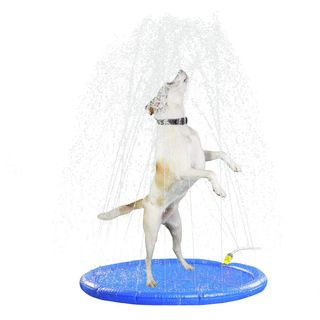10 Most Common Dog Illnesses and Conditions - Country Living
Ear infections, kennel cough and ringworm are among the common illnesses dogs may develop. Pups of all ages can suffer from a range of medical problems, so it's important owners learn the common conditions, how to spot them and tips on how they can be treated.
Not sure what to look out for? Keep reading to find out everything you need to know...
1. Kennel cough
The name given to infectious bronchitis in dogs, kennel cough is one of the most common contagious diseases that is caused by a combination of viruses and bacteria. One of the most obvious symptoms of kennel cough is a forceful, hacking cough that can often sound like your pup has something lodged in their throat.
The team at Everypaw Pet Insurance explain: "Affected dogs should be kept in a warm environment, have restricted exercise, and kept away from other animals to prevent spreading. Treatment is not necessary as the cough gradually resolves after 2-3 weeks. But antibiotics can be given if the infection spreads to the chest."
2. Fleas
Dog fleas – small insects that lay their eggs in fur — is another common condition many pet parents may come across. Not sure what signs to look out for? Dogs with fleas will scratch, bite and lick themselves to relieve the itching. You may also notice your dog suffering from crusty rashes or hair less, particularly those that are allergic to fleas.
"To prevent flea infestations you will need to regularly treat your dog and home," say the team. "There are tablets, powders, sprays, spot-ons and shampoos available to kill adult and immature fleas. You will need to wash your dog's bedding and hoover flooring to get rid of eggs."
3. Pancreatitis
Pancreatitis is an inflammatory condition that is common in dogs and cats, causing the digestive enzymes to leak into the pancreas and self-digest. According to Everypaw Pet Insurance, the signs to look out for include your dog refusing to eat, feeling sad and abdominal upset. If you are concerned about your dog's health, always head to your local vet.
4. Ringworm
Ringworm has a number of different appearances in dogs, with the main sign being areas of hair loss with a crusty covering. This common fungal infection is highly contagious and can be passed from dogs to other animals or humans, so it needs to be treated immediately.
Once you have visited the vet, don't forget to throughly clean your dog's environment to banish the presence of ringworm. Deep-clean their bedding, toys, bed and food bowl.
5. Dog diarrhoea
"There are many causes of diarrhoea, including changes in diet, bacterial infections, poisonous chemicals, or damage to the digestive system. It occurs when there is a disturbance to the normal function of the large bowel (intestine)," the experts say.
"Dogs suffering from diarrhoea may need to empty their bowels more frequently and will have softer than normal stools. Feed your dog a diet of plain chicken and rice, and it should improve in 1-2 days." If your dog hasn't improved by then, head to your local vet for advice. Puppies with diarrhoea dehydrate quickly, so should be seen by a vet sooner.
6. Dog ear infections
Ear infections are often caused by excess moisture, which can become painful, itchy and produce a bad smell. If your dog is suffering from an ear infection, you may notice them beginning to groan, cry, shake their ears and head, or rub up against the floor to relieve pain.
"Most ear infections can be treated with ear drops and regular cleaning of the ears. But the primary disease will also need to be treated to prevent a recurrence," say the team.
7. Conjunctivitis
Much like humans, conjunctivitis is an uncomfortable condition that may cause your dog to paw at their eye, blink or squint. In most cases, your local vet will be able to treat the condition with eye drops or ointment, however some pups will require antibiotic treatment if this is an underlying problem.
8. Mange
"Mange is caused by an infestation of tiny mites on the dog's skin, causing hair loss and itching," continue Everypaw Pet Insurance. "Dogs will scratch and chew to relieve the itch, causing damage to the skin. They are highly contagious and can easily pass onto other dogs. They are generally only passed from mother to pup via muzzle."
While it is an unpleasant experience for dogs, the good news is that it can be easily treated using drugs, anti-parasitic shampoos, dips and spot-ons.
9. Poisoning
From dangerous spring plants to festive foods, poisoning in dogs occurs when they swallow or absorb something dangerous. Common signs include:
- Drowsiness
- Vomiting or diarrhoea
- Salivation or drooling
- Breathing difficulties
- Seizures
- Hallucinations
If you think your dog has been poisoned, you must take them to the vet immediately for treatment to give them a better chance of survival. Pet parents should also keep all poisonous substances, cleaning products and toxic foods well out of reach.
10. Blocked anal glands
"Blocked anal glands occur when the sacs fail to empty, usually due to loose faeces or if the dog's gland ducts are too narrow. Affected dogs will excessively lick the area, drag their bottom on the ground, and sit down abruptly clamping their tail," say the experts.
"A vet or owner (if shown how) can manually empty the anal glands. But chronic blockages need to be drained, flushed and treated with antibiotics. Adding more fibre to the diet may help to prevent a recurrence."
This content is created and maintained by a third party, and imported onto this page to help users provide their email addresses. You may be able to find more information about this and similar content at piano.io

















Comments
Post a Comment